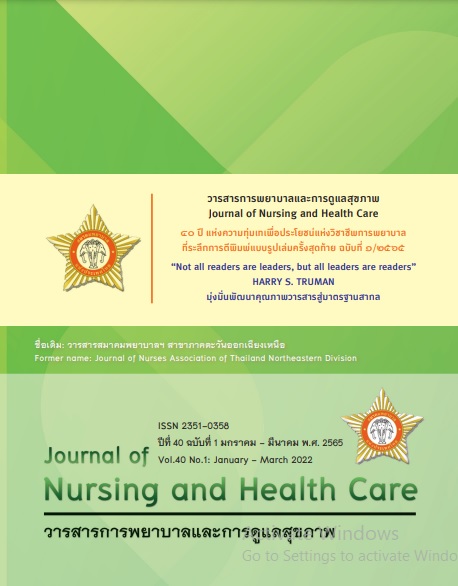การพัฒนาแนวทางส่งเสริมการจัดการตนเอง ของผู้ป่วยเบาหวานที่ควบคุมระดับน้ำตาลในเลือดไม่ได้โดยการมีส่วนร่วมของชุมชน
คำสำคัญ:
คำสำคัญ : การพัฒนาแนวทาง การจัดการตนเอง ผู้ป่วยเบาหวานที่ควบคุมระดับน้ำตาลในเลือดไม่ได้ การมีส่วนร่วมของชุมชนบทคัดย่อ
การวิจัยเชิงปฏิบัติการนี้มีวัตถุประสงค์ เพื่อวิเคราะห์สถานการณ์และพัฒนาแนวทางส่งเสริมการจัดการตนเองของผู้ป่วยเบาหวานที่ควบคุมระดับน้ำตาลในเลือดไม่ได้โดยการมีส่วนร่วมของชุมชน คัดเลือกผู้ร่วมวิจัยแบบจำเพาะเจาะจงทั้งหมด 40 คนประกอบด้วย ผู้ป่วยเบาหวานที่ควบคุมระดับน้ำตาลในเลือดไม่ได้ 14 คน ผู้ดูแล 14 คน อาสาสมัครสาธารณสุขประจำหมู่บ้าน 8 คน ผู้นำชุมชน 2 คน สมาชิกองค์การบริหารส่วนตำบล 1 คน เจ้าหน้าที่สาธารณสุข 1 คน เครื่องมือที่ใช้ในการวิจัยประกอบด้วย แบบสัมภาษณ์เชิงลึก แนวทางสนทนากลุ่ม แนวทางประชุมระดมสมองสะท้อนคิด และแนวทางการสังเกตแบบไม่มีส่วนร่วม วิเคราะห์ข้อมูลเชิงปริมาณโดยหาค่าความถี่ ค่าเฉลี่ย ร้อยละ และข้อมูลเชิงคุณภาพใช้การวิเคราะห์เชิงเนื้อหา
ผลการวิจัย ก่อนการพัฒนา ผู้ป่วยเบาหวานที่ควบคุมระดับน้ำตาลในเลือดไม่ได้ยังไม่สามารถจัดการตนเองได้เหมาะสมในพฤติกรรมสุขภาพ 3 ด้านได้แก่ 1) ด้านการรับประทานอาหาร 2) ด้านการออกกำลังกาย 3) ด้านจัดการความเครียด ผลการพัฒนาพบว่า แนวทางส่งเสริมการจัดการตนเองของผู้ป่วยเบาหวาน ฯ แบ่งเป็น 2 แนวทาง ได้แก่ 1)แนวทางสำหรับผู้ป่วยเบาหวานและครอบครัว และ2) แนวทางสำหรับทีมส่งเสริมในชุมชน ภายหลังการนำแนวทางส่งเสริมฯ ไปใช้ ผู้ป่วยเบาหวานควบคุมระดับน้ำตาลในเลือดได้ดีขึ้น (ร้อยละ 28.58) และมีพฤติกรรมสุขภาพดีขึ้น (ร้อยละ 85.71)
Downloads
เอกสารอ้างอิง
International Diabetes Federation. IDF Diabetes Atlas. 10th ed. Brussels, Belgium; 2019.
Ekplakorn W. Report of the 5th Survey of Thai People’s Health by Physical Examination 2014. Nonthaburi: Graphic and design publishing house, Thailand; 2016.
Diabetes Association of Thailand under the Royal Patronage of HRH Princess Maha Chakri Sirindhorn Her Royal Highness Princess Maha Chakri Sirindhorn; 2017.
Kongsub J. Exercise self-management in type 2 diabetes patients. Master of Nursing Thesis. Khon Kaen: Khon Kaen University, Thailand; 2012.
Sindhu S, Boonrot P. Case Management of Diabetes and Hypertension Patients. (2nd ed). Bangkok: Wattana Printing Press, Thailand; 2014.
Creasy R. Diabetes: Fundamentals and Related Laboratory Tests. (2nd ed). Chiang Mai: Chiang Mai University Press, Thailand; 2014.
Soonthornyothin S, Buranasapkhajorn P. Diabetes Textbook. (2nd ed). Bangkok: Faculty of Medicine Chulalongkorn University, Thailand; 2013.
Rungruengkonkit S. Prevalence and predictors of depression in type 2 diabetes patients. Journal of the Psychiatric Association of Thailand 2014; 59(3): 287-98.
Ratrasarn C. The Blueprint for Change Programme. Bangkok: Novo Nordisk Pharma Thailand Co., Ltd. Thailand; 2017.
American Diabetes Association. Diabetes Care 2020. American Diabetes Association, USA; 2020.
Prapubphon P. et al. Quality of life of chronic disease patients with and without complications and guidelines for improving quality of life for chronic disease patients. Nonthaburi: Health Systems Research Institute (HSRI), Thailand; 2015.
Soisong S. et al. Self-care behaviors according to the perception of patients with type 2 diabetes who cannot control blood sugar levels. Journal of Phrapokklao Nursing College, Chanthaburi 2017; 28(2): 93-103.
Wandao Y. et al. Self-management of type 2 diabetes patients. Songklanakarin Journal of Nursing 2018; 38(3): 52-64.
Inthabutr M, Muktaphan B, Perception and Dietetic Practice of Patients with Type 2 Diabetes Mellitus. Srinakarin Journal 2011; 23(2): 83-90.
Thanasavanon S. et al. Reasons for default in diabetic patients. Diabetes Clinic. Journal of Phrae Hospital 2011; 19(2): 85-96.
Buraphan R, Muangsom N. Factors Affecting Uncontrollable Blood Sugar Levels in Type 2 Diabetes Patients, Sangcom Hospital. Udon Thani Province. Journal of Public Health Research 2013; 6(3): 102-9.
Tantayothai W. Narratives of the Royal Thai Police. 2010. Bangkok: Udomrat Printing and Design, Thailand; 2010.
Creer T. Self-management of chronic illness. San Diego: In M. Doekaert Academic, California; 2000.
UK Prospective Diabetes Study (UKPDS) Group. Effect of intensive blood-glucose control with metformin on complications in overweight patients with type 2 diabetes [Internet].1998[Cited 1998 Nov 7]. Available from: https://www.rcbinlm.nih. gove/pubmed/9742977
Kamolwit S, Konghan S. A meta-analysis of the effectiveness of a self-management program on blood glucose and hemoglobin A1C of type 2 diabetes patients in Thailand. Medical Journal 2017; 28(3): 755-62.
Tongthong S, Chinnawong T, Thaniwat P. Effects of Self-Management Support Program for Slowing diabetic renal impairment on self-management behaviors and clinical outcomes in patients with uncontrolled type 2 diabetes mellitus. sugar in the blood Songklanakarin Journal of Nursing 2015; 35(1): 67-82.
Wattana C. Supporting self-management: strategies for promoting disease control. Journal of Phrapokklao College of Nursing. Chanthaburi 2015; 26(additional): 117-27.
Tasniyom N, Tasniyom S. Health promotion Empowerment. Khon Kaen: Nana Wittaya Archives, Thailand; 2012.
Ninwarangkun K. Action Research for Community Nurses. Khon Kaen: Nana Wittaya Archives, Thailand; 2015.
Jirawatkul S. Qualitative Research in Nursing: Research Methods and Case Studies. Bangkok, S. Asia Press (1989) Co., Ltd, Thailand; 2012.
ดาวน์โหลด
เผยแพร่แล้ว
รูปแบบการอ้างอิง
ฉบับ
ประเภทบทความ
สัญญาอนุญาต
ลิขสิทธิ์ (c) 2022 วารสารการพยาบาลและการดูแลสุขภาพ

อนุญาตภายใต้เงื่อนไข Creative Commons Attribution-NonCommercial-NoDerivatives 4.0 International License.



